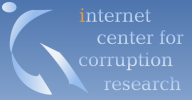
| Home → Publication |  |
| Home | |||
| Contact information | |||
| Research Area | |||
| Corruption Perceptions Index | |||
| Lecture and Workshops |
The New Institutional Economics of Corruption, edited by Johann Graf Lambsdorff, Markus Taube and Matthias Schramm
| Following a workshop organized by the editors
a new publication on the New Institutional Economics of Corruption is now available. The volume has been published
by Routledge: London, September 2004.
Corruption is a major barrier to sound development, affecting a wide range of economies across the world. Measuring and explaining corruption is no easy task; this book sets about it with real vigour. Examining the institutional foundations of corrupt transactions, this book provides a new perspective towards the analysis of corrupt behaviour as well as the design of anti-corruption policies. It does so by identifying institutions that may facilitate corruption, such as particularistic trust, social norms that foster reciprocity, intermediaries, hierarchies and network-type organizations. With an international troop of contributors, this book will impress academics with an interest in institutional economics, sociology and corruption. It will also prove to be a useful addition to policy-makers in the sphere of fighting corruption. Excerpt from the introduction:
|

|